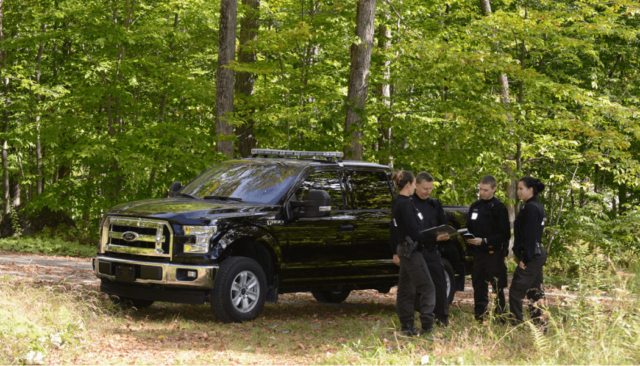Description
Full-time
In the community
1305 hours

This training prepares you to become a Wildlife Protection in Eeyou Istchee, a person responsible for protecting wildlife and its habitats while respecting Cree traditions and the laws and regulations of the Cree, federal and provincial governments, in a perspective of sustainable development.
Wh’at’s more, you’ll learn to gravitate in an environment requiring constant adaptation to socio-political contexts.
This training is only offered in English.
List of competency
Analyze the work function
Act within the legal and ethical frameworks governing the profession
Communicate with the users of wildlife and its habitats
Process mapping information
Work in isolated and rustic conditions in the natural environment
Contend with a person's reactions and behaviours
Detect the presence of anomalies in wildlife species
Impart values, principles, and good practices to the members of the community
Perform control operations concerning large mammals in conflict with humans
Carry out an intervention related to the protection of wildlife and its habitats
Carry out an inspection related to the protection of wildlife and its habitats
Execute a judicial operation related to the protection of wildlife and its habitats
Cultural values and practices related to Eeyou Istchee
Do you have the profile?
This program is designed for you if:

Admission requirements and fees
Admission requirements
General admission requirements
To learn more about the general admission requirements and the required documents for an application to an Attestation of Collegial Studies (ACS) program, please visit the following page:
Specific admission requirements
To be eligible to this program, in addition to meeting the general admission requirements, you must:
- be enrolled or entitled to be enrolled as a Cree beneficiary pursuant to section 3 of the James Bay and Northern Quebec Agreement and Complementary Agreements;
- having good communication skills;
- having good physical ability.
Specific document required
To be admitted to this program, you will need to provide, in addition to the documents required in the general admission requirements, the following document:
- Indian Status Card or Inuit Beneficiary Card
Fees
To learn more about the fees required for an application to an Attestation of Collegial Studies (ACS) program, please visit the following page:
Course Grid
The work function
Legislation and Ethics
Communication in Cree
Communication in French
Communication in English
Cartography
Aerial Photographs
Working in Remote Location
Communicating as a Person in a Position of Authority
Conflict Management
Wildlife Diseases
Cultural Activities
Unwanted Animals
Planning an Intervention
Wildlife Protection Intervention
Inspection Process
Planning and Inspection
Compliance Inspection
Judiciarization
Operational Planning
Judicial Operations
The Human's Relationship with the Earth
After the ACS
On the way to the job market
Profession: Cree Wildlife Enforcement Officer
You will be able to work in:







